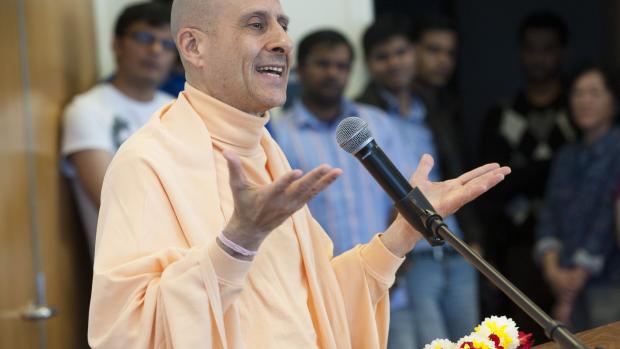Radhanath Swami Discusses His ‘Journey Home’ at NYU-Poly

On the busiest travel day of the year — the Wednesday before Thanksgiving — few students or attendees looked in any hurry to leave LC 400 in Polytechnic Institute of NYU’s Dibner Building. Throughout the lunch hour, guests poured into the room and stood at its peripheries, unable to find a seat in the crowded space. The reason? A visit from guru Radhanath Swami, who follows the Gaudiya Vaishnava (also known as Hare Krishna) tradition.
The spiritual leader spearheads many social initiatives, such as the Midday Meal program, which feeds 250,000 underprivileged children daily in Mumbai, India and the Barsana Eye Camp which has organized a free cataract surgery camp for the villagers of the Barsana area every year since 1992. Taking time out of his busy schedule, last week the religious figure visited NYU-Poly to talk about his book, A Journey Home: The Autobiography of an American Swami, which Rachel Stark, who teaches a first-year writing seminar for NYU-Poly’s Department of Humanities and Social Sciences, included in her curriculum. “We’ve been studying literature that chronicles injustice,” she said, citing political leader Malcolm X and African-American Nobel Prize winner Toni Morrison as authors also represented in the course. Incorporating A Journey Home into the curriculum was her way of bringing in “an autobiography of someone who sought the spiritual path, as opposed to someone who sought the political or literary path,” explained Stark.
A Journey Home chronicles the spiritual development of Radhanath Swami, who grew up as Richard “Richie” Slavin in the Chicago suburbs of the 1950s and 60s. He left the comforts of that life at the age of 19 to travel across Europe, the Middle East and India, seeking spiritual fulfillment. The young American encountered colorful, spiritual characters along the way, as well as many dangers, but he eventually settled in Mumbai permanently, returning to the United States periodically to share his story and encourage the Bhakti yoga tradition, which he has practiced for 40 years.
Radhanath Swami opened his visit by chanting before the audience and then speaking about what it was like to grow up as a spiritually conflicted teenager in the 1960s. “How could I be satisfied in the idyllic setting of Highland Park when just a few miles away in the ghettoes of Chicago people, because of the color of their skin, were persecuted and suffering?” he asked.
Radhanath Swami touched on the civil rights movement of the 60s and also addressed the skepticism his friends in the counterculture felt towards the Vietnam War, as well as the excitement generated by musicians of that era — “prophets of my generation,” he called them. He balanced his talk by considering his parents’ past and the history of those in authority at the time. “They grew up during the Great Depression,” said Radhanath Swami. “We had all the stuff they never had, and we took it for granted. We had the luxury of being idealistic.”
Afterward, Umesh Somrah, a student in Stark’s class, said he learned a lot from the talk. Redwan Hussain, an electrical engineering major, agreed with his classmate, noting how Radhanath Swami “grew up in America and moved onto the East — he was able to juxtapose different values different societies have.”
The students’ comments appear to meet the goals Stark has set for the class. “We’re educating our students to be part of a world community,” she said. “We’re no longer a community in isolation, and I felt it was very important to give them knowledge of different religions, different spiritual paths, different voices.” Given the crowd surrounding Radhanath Swami as he continued to sign books long after his talk, students seemed just as enthusiastic about those goals.




